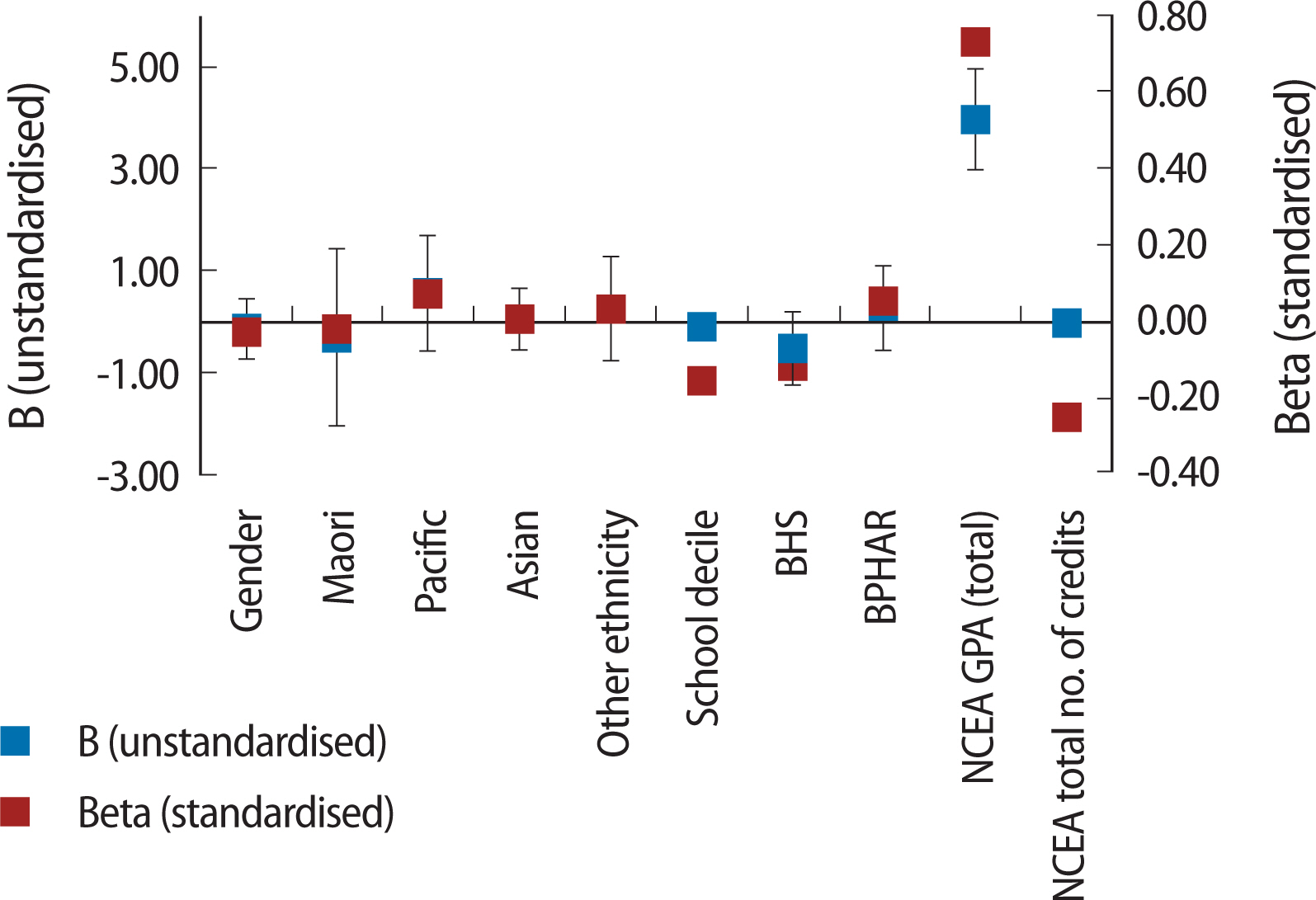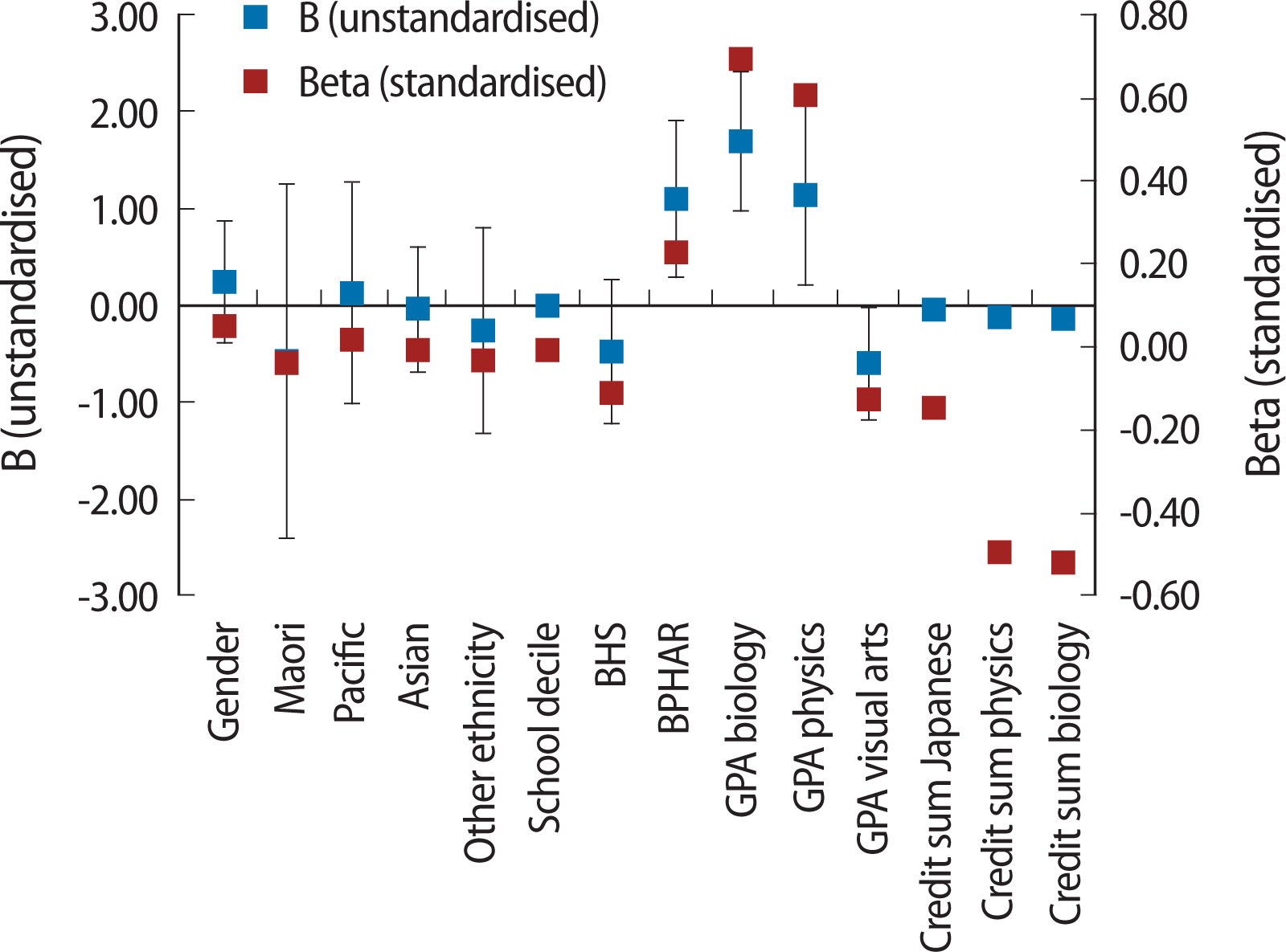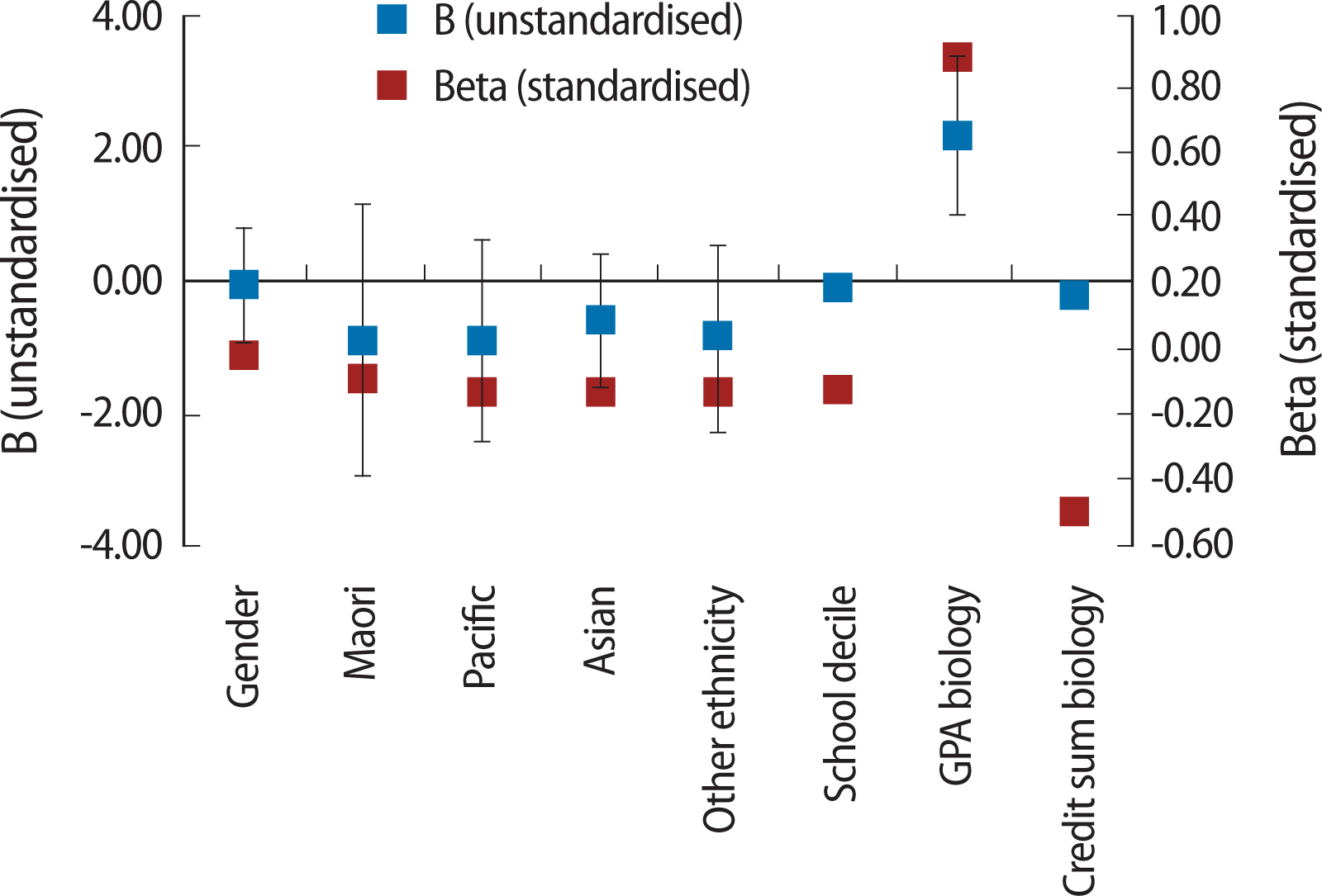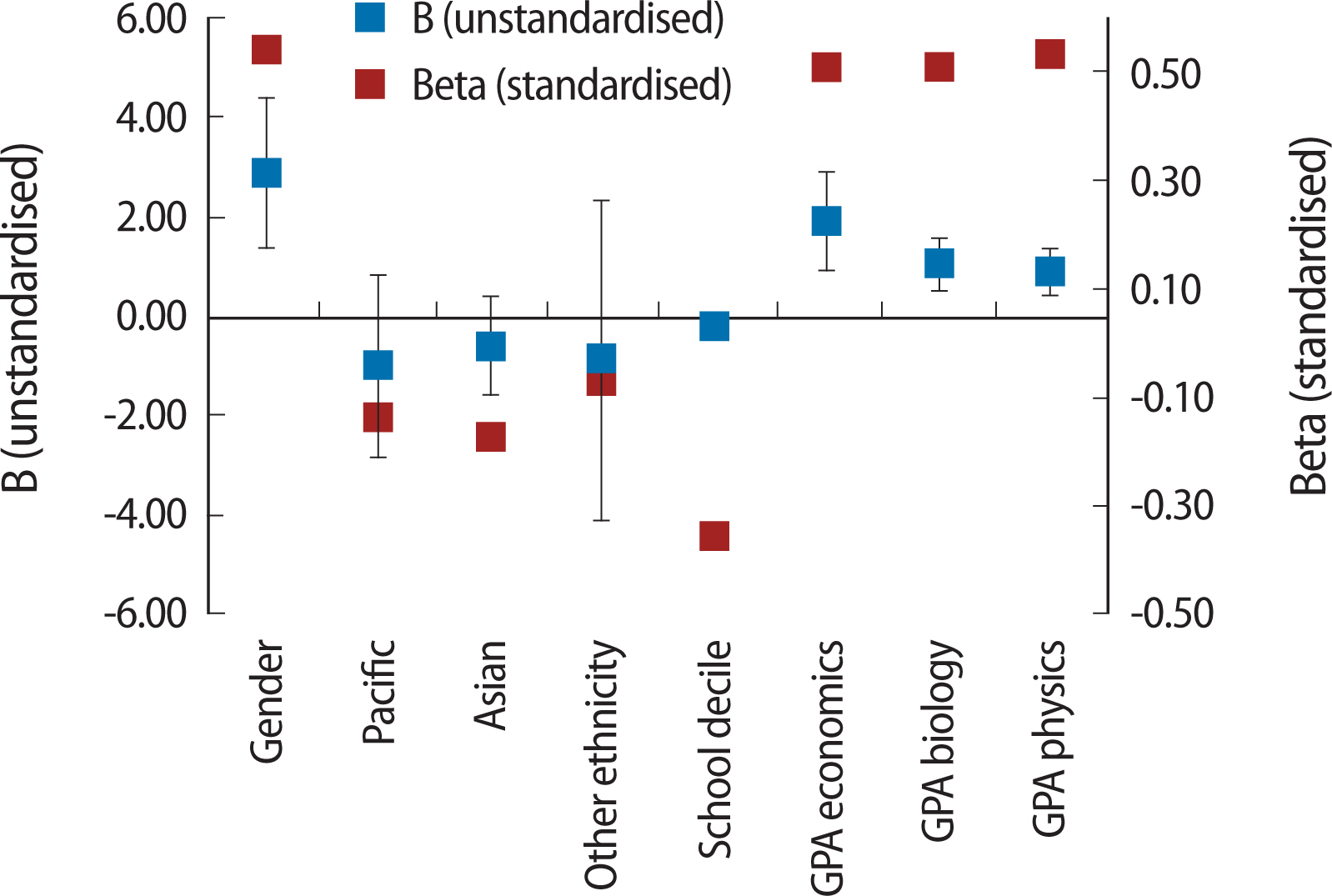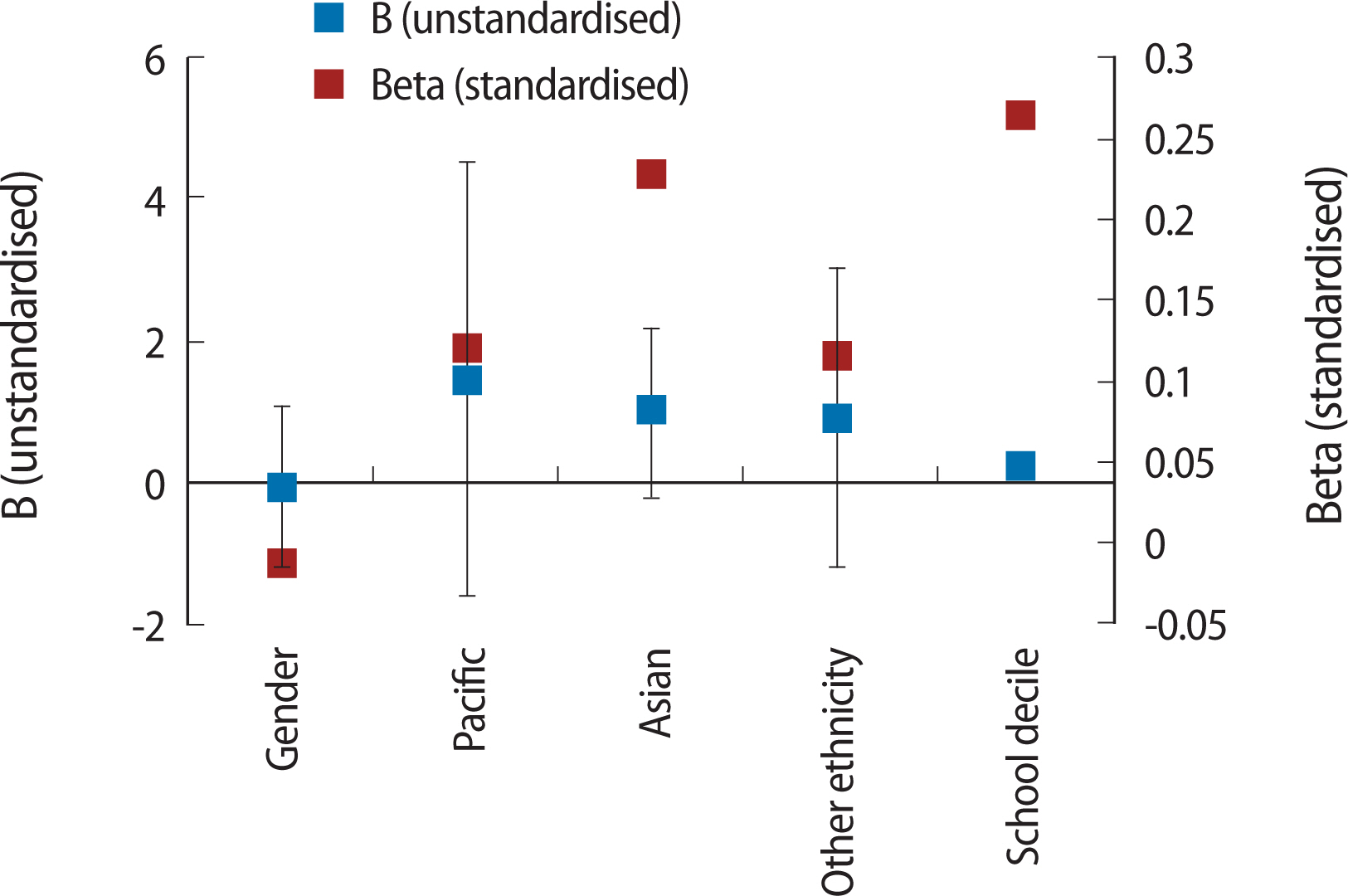J Educ Eval Health Prof.
2012;9:7.
Breadth of knowledge vs. grades: What best predicts achievement in the first year of health sciences programmes?
- Affiliations
-
- 1Centre for Medical and Health Sciences Education, Faculty of Medical and Health Sciences, University of Auckland, Auckland, New Zealand. b.shulruf@auckland.ac.nz
- 2College of Medicine, Swansea University, Swansea, UK.
Abstract
- This study aimed to identify those features within secondary school curricula and assessment, particularly science subjects that best predict academic achievement in the first year of three different three-year undergraduate health professional programmes (nursing, pharmacy, and health sciences) at a large New Zealand university. In particular, this study compared the contribution of breadth of knowledge (number of credits acquired) versus grade level (grade point average) and explored the impact of demographic variables on achievement. The findings indicated that grades are the most important factor predicting student success in the first year of university. Although taking biology and physics at secondary school has some impact on university first year achievement, the effect is relatively minor.
Keyword
MeSH Terms
Figure
Reference
-
1. Croft C. The conflicting world of standards-based assessment. In : National Conference of the New Zealand Association for Research in Education; 1993 Dec 2–5; Hamilton, New Zealand.2. Wilson P. Potential impacts of the new school qualifications environment in New Zealand on tertiary engineering education. Glob J Eng Educ. 2003; 7:103–12.3. Dobric K. Discourses in qualifications policy adoption in New Zealand, 1996–2000 identifying power imbalances in a transformative process. In : First International Congress of Qualitative Inquiry; 2005 May 5–7; Urbana-Champaign, IL, USA.4. Crooks TJ. Educational assessment in New Zealand schools. Assess Educ Princ Policy Pract. 2002; 9:237–53.
Article5. University of Auckland. Admission to the University of Auckland in 2005 for year 13 students. Auckland: University of Auckland;2003.6. Shulruf B, Hattie J, Tumen S. The predictability of enrolment and first-year university results from secondary school performance: the New Zealand National Certificate of Educational Achievement. Stud High Educ. 2008; 33:685–98.
Article7. Hipkins R. Changing school subjects for changing times [Internet]. Wellington: New Zealand Council for Educational Research;2004. [cited 2012 May 5]. Available from http://www.nzcer.org.nz/pdfs/12815.pdf.8. Scott D. How does achievement at school affect achievement in tertiary education? Wellington: Ministry of Education;2008.9. Shulruf B, Keuskamp D. Course taking and student achievements meta-analysis and a critical review of the literature. In : 12th Biennial Conference for Research on Learning and Instruction; 2007 Aug 28 – Sep 1; Budapest, Hungary.10. Shulruf B, Turner R, Hattie J. A dual admission model for equity in higher education: a multi-cohort longitudinal study. Procedia Soc Behav Sci. 2009; 1:2416–20.
Article11. Campbell AR, Dickson CJ. Predicting student success: a 10-year review using integrative review and meta-analysis. J Prof Nurs. 1996; 12:47–59.
Article12. Goldberg EL, Alliger GM. Assessing the validity of the GRE for students in psychology: a validity generalization approach. Educ Psychol Meas. 1992; 52:1019–27.
Article13. Morrison T, Morrison M. A meta-analytic assessment of the predictive validity of the quantitative and verbal components of the graduate record examination with graduate grade point average representing the criterion of graduate success. Educ Psychol Meas. 1995; 55:309–16.
Article14. Kuncel NR, Ones DS, Hezlett SA. A comprehensive meta-analysis of the predictive validity of the graduate record examinations: implications for graduate student selection and performance. Psychol Bull. 2001; 127:162–81.
Article15. McDonald A, Newton P, Whetton C, Benefield P. Aptitude testing for university entrance: a literature review. Berkshire, UK: National Foundation for Educational Research;2001.16. Allen DD, Bond CA. Prepharmacy predictors of success in pharmacy school: grade point averages, pharmacy college admissions test, communication abilities, and critical thinking skills. Pharmacotherapy. 2001; 21:842–9.
Article17. Newton SE, Smith LH, Moore G, Magnan M. Predicting early academic achievement in a baccalaureate nursing program. J Prof Nurs. 2007; 23:144–9.
Article18. Yates J, Smith J, James D, Ferguson E. Should applicants to Nottingham University Medical School study a non-science A-level? A cohort study. BMC Med Educ. 2009; 9:5.
Article19. McManus IC, Smithers E, Partridge P, Keeling A, Fleming PR. A levels and intelligence as predictors of medical careers in UK doctors: 20 year prospective study. BMJ. 2003; 327:139–42.
Article20. McManus IC, Powis DA, Wakeford R, Ferguson E, James D, Richards P. Intellectual aptitude tests and A levels for selecting UK school leaver entrants for medical school. BMJ. 2005; 331:555–9.
Article21. McCall KL, MacLaughlin EJ, Fike DS, Ruiz B. Preadmission predictors of PharmD graduates’ performance on the NAPLEX. Am J Pharm Educ. 2007; 71:5.
Article22. Chisholm MA, Cobb HH, Kotzan JA. Significant factors for predicting academic success of first-year pharmacy students. Am J Pharm Educ. 1995; 59:364–70.23. Chisholm MA. Students performance throughout the professional curriculum and the influence of achieving a prior degree. Am J Pharm Educ. 2001; 65:350–4.24. Ferguson E, James D, Madeley L. Factors associated with success in medical school: systematic review of the literature. BMJ. 2002; 324:952–7.
Article25. Strachan J. Assessment in change: some reflections on the local and international background to the National Certificate of Educational Achievement (NCEA). NZ Annu Rev Educ. 2001; 11:245–74.
Article26. Shulruf B, Hattie J, Tumen S. The New Zealand’s standard based assessment for secondary schools (NCEA): implications for policy makers. Asia Pac J Educ. 2010; 30:141–65.27. Cabrera AF. Logistic regression analysis in higher education: an applied perspective. Smart JC, editor. Higher education: handbook of theory and research. 10. New York: Agathon Press;1994. p. 225–56.28. Zarate N. Predictive factors of academic success for freshmen of a multicultural university [dissertation]. Las Cruces: New Mexico State University;1976.29. Quinn DM. Coursework and the academic achievement of urban high school students [dissertation]. Iowa: University of Iowa;1994.30. Hipkins R, Vaughan K. Well I know I need to English and maths.... [Internet]. Wellington: New Zealand Council for Educational Research;2002. [cited 2012 May 5]. Available from http://www.nzcer.org.nz/pdfs/12762.pdf.31. Shulruf B, Hattie J, Tumen S. Individual and school factors affecting students’ participation and success in higher education. High Educ. 2008; 56:613–32.
Article32. Gross AL, Fleischman L. Restriction of range corrections when both distribution and selection assumptions are violated. Appl Psychol Meas. 1983; 7:227–37.
Article33. Kellett A, editor. 2005 calendar: The University of Auckland. Auckland: University of Auckland;2004.
- Full Text Links
- Actions
-
Cited
- CITED
-
- Close
- Share
- Similar articles
-
- A Model for Design of Tailored Working Environment Intervention Programmes for Small Enterprises
- The Influence of Admission Characteristics on Premedical School Achievement at a Medical School
- Nursing Student Academic Achievement depending on College Entrance System-related Factors
- Effects of an Educational Program about Reproductive Health Promotion on Sexual Knowledge and Attitudes of University Students from Korea
- Mediation Effects of Calling and Role Breadth Self-efficacy on the Relationship between Supportive Supervision and Job Crafting of Nurses in General Hospitals

